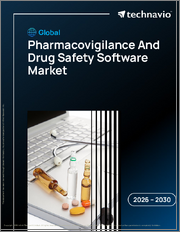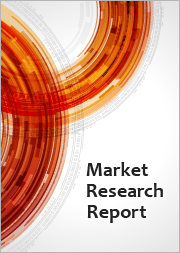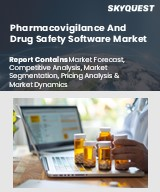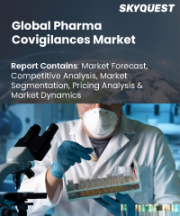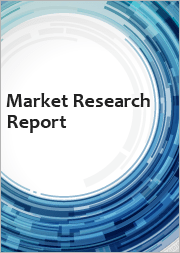
|
시장보고서
상품코드
1820217
약물감시 시장 규모, 점유율, 동향, 예측 : 서비스 제공업체별, 제품수명주기별, 유형별, 프로세스 플로우별, 치료 영역별, 최종 용도별, 지역별(2025-2033년)Pharmacovigilance Market Size, Share, Trends and Forecast by Service Provider, Product Life Cycle, Type, Process Flow, Therapeutic Area, End Use, and Region, 2025-2033 |
||||||
세계 약물감시 시장 규모는 2024년 85억 달러에 달했습니다. IMARC Group은 2033년까지 163억 달러에 달하고, 2025-2033년 7.5%의 연평균 복합 성장률(CAGR)을 보일 것으로 예측했습니다. 현재 북미가 33.7%의 점유율을 차지하며 시장을 독점하고 있습니다. 의약품의 복잡화, 세계 규제 강화, AI 및 빅데이터 활용 확대, 폴리파마시 및 약물 오남용에 따른 부작용 증가, 제약사의 임상 및 시판 후 안전관리 아웃소싱 확대 등으로 시장이 확대되고 있습니다.
약물감시 시장은 의약품 부작용(ADR)의 확산, 시판 후 약물 모니터링에 대한 수요 증가, 전 세계적으로 강화되는 규제 요건에 의해 주도되고 있습니다. 또한, 인공지능(AI)과 빅데이터 분석의 도입이 진행되면서 신호 감지 및 의약품 안전성 평가가 강화되고 효율성이 향상되어 시장 성장에 일조하고 있습니다. 예를 들어, 2024년 유럽의약품청(EMA)은 약물감시에서 AI를 사용하기 위한 도구와 가이드라인을 발표하여 약물 안전성 감시를 개선하기 위해 기술을 사용하겠다는 의지를 표명했습니다. 또한, 제약 및 생명공학 산업의 성장은 의약품 개발 중 철저한 안전성 모니터링에 대한 수요를 촉진하여 시장 확대에 더욱 기여하고 있습니다. 이 외에도 만성질환의 급증과 신약 출시는 강력한 약물감시 시스템에 대한 수요를 증가시키며 시장에 활력을 불어넣고 있습니다. 또한, 약물감시 업무를 전문업체에 아웃소싱함으로써 컴플라이언스를 유지하면서 운영비용을 절감할 수 있어 시장 성장의 기폭제가 되고 있습니다.
미국의 약물감시 시장은 철저한 안전성 모니터링이 필요한 임상시험을 많이 수행하는 대규모 제약업계가 주도하고 있습니다. 이에 따라 바이오시밀러와 맞춤형 의료의 등장은 의약품 안전성 평가의 복잡성을 증가시켜 시장 수요를 증가시키고 있습니다. 동시에 미국 식품의약국(FDA)의 센티넬 이니셔티브와 같은 의약품 안전 감시를 촉진하는 정부 이니셔티브가 시장 성장을 가속하고 있습니다. 또한, 환자 중심 접근법과의 융합이 진행되면서 안전성 평가를 위한 실제 데이터 수집이 중요해지면서 약물감시 시장 점유율이 확대되고 있습니다. 또한, 규제 당국과 제약사의 협력으로 컴플라이언스 및 모니터링 체계가 강화되어 시장 성장을 뒷받침하고 있습니다. 이와는 별도로, 원격 의료 및 디지털 헬스 툴의 급속한 보급은 ADR의 원격 보고 및 모니터링을 촉진하여 시장 성장을 가속하고 있습니다.
파마코비젼 시장 동향 :
기술 발전으로 인한 약물감시 업무의 변화
파마코비젼 시장 전망은 자동화와 인텔리전스 기반 워크플로우의 역할에 주목하고 있습니다. AI, 머신러닝(ML), 자연어처리(NLP), 빅데이터 분석 등의 기술은 기존의 약물감시 모델을 민첩하고 데이터가 풍부한 생태계로 변화시키고 있습니다. 이 도구들은 방대한 데이터 세트를 빠른 속도와 규모로 처리함으로써 핵심 기능(특히 ADR 모니터링, 신호 감지, 규제 당국 보고 등)을 강화합니다. 최근 시장 조사에 따르면, 세계 ML 산업은 2024년 310억 달러에 달할 것으로 예상되며, 그 중 약물감시는 가장 빠르게 성장하는 용도 중 하나로 부상했습니다. 사노피와 Deloitte의 ConvergeHEALTH Safety 플랫폼은 AI를 사용하여 사례 수집을 간소화하고 ArisGlobal의 USFDA FAERS II 시스템과의 통합을 통해 전자 안전 신청서를 강화하는 등 영향력 있는 협업으로 새로운 벤치마크를 세우고 있습니다. 와의 통합을 통해 전자적 안전 신청을 강화했습니다. Saama Technologies의 ASAP 솔루션은 FDA의 Sentinel Common Data Model과 TreeScan 기법을 활용하여 실시간 위험 감지를 더욱 발전시키고 있습니다.
정부 규제와 현실적 증거는 시장 확대를 강화합니다.
현재 약물감시 시장 개요에서 명확하게 읽을 수 있는 것은 전 세계적으로 규제 당국의 감시가 강화되고 있다는 점입니다. USFDA, EMA, CDSCO, TGA 등의 기관은 경계를 강화하고 있으며, 특히 신약 및 복잡한 치료법의 생산이 증가함에 따라 안전성 보고에 대한 엄격한 의무를 부과하고 있습니다. Aurobindo Pharma USA의 퀴나프릴과 하이드로클로로티아지드 정제의 니트로소아민 혼입으로 인한 리콜은 검사 기준의 엄격화가 얼마나 중요한지를 잘 보여주고 있습니다. 이러한 에피소드는 제약사들로 하여금 내부 시스템을 강화하고 외부의 파마코비즈니스 파트너를 찾게 하는 원동력이 되고 있습니다. 또한, 시판 후 조사에 대한 의존도가 높아짐에 따라, 특히 약물 남용과 폴리파머시(polypharmacy)가 증가하는 환경에서 ADR 모니터링의 중요한 역할이 부각되고 있습니다. 규제 당국의 기대는 현재 시험 단계와 장기적인 환자 결과를 파악할 수 있는 실제 사용 데이터에 집중되어 있습니다. Frontiers in Drug Safety and Regulation에 게재된 연구는 임상의 틀을 넘어 의약품의 위험 프로파일을 업데이트하는 리얼월드에비던스(RWE)의 가치를 강조하고 있습니다.
의약품이 복잡해짐에 따라 제약기업의 파마코비즈니스 서비스에 대한 수요가 증가하고 있습니다.
최근 약물감시 시장 동향은 제약사의 안전성 모니터링 서비스에 대한 수요가 급증하고 있음을 보여줍니다. 이러한 변화의 배경에는 특히 생물학적 제제, 유전자 치료, 개인 맞춤형 의료에서 신약 제조의 복잡성이 있습니다. 질병 부담 증가, 특히 만성질환과 동반질환 증가에 따라 환자들은 여러 약물을 동시에 처방받는 경우가 많아 상호 작용과 예상치 못한 부작용의 가능성이 높아지고 있습니다. 이러한 복잡성을 관리하기 위해 제약회사는 약물감시 업무를 전문 서비스 제공업체에 아웃소싱하고 있습니다. 이들 기업은 확장 가능한 인프라, 숙련된 분석가, 지역 규제 정보에 대한 액세스를 제공합니다. IQVIA와 NRx Pharmaceuticals의 의료 정보 및 약물감시 관련 전략적 파트너십은 아웃소싱이 비용 절감에서 성과 향상으로 진화했음을 보여줍니다. 이러한 추세는 파마코비젼 시장 보고서의 또 다른 중요한 통찰력을 반영합니다. 아웃소싱을 통해 기업은 핵심 기술 혁신에 집중할 수 있으며, 동시에 세계 시장에서 엔드 투 엔드 의약품 안전 모니터링을 유지할 수 있습니다.
복잡한 임상시험과 폴리파마슈티컬로 시장 모멘텀 가속화
임상시험 증가와 복잡성 증가는 약물감시 시장 예측의 주요 성장 동력입니다. 최근 시장 데이터에 따르면, 2023년에는 22,000개 이상의 새로운 임상시험이 시작될 것으로 예상되며, 그 중 상당수는 적응성이 높은 프로토콜, 분산화된 요소, 환자 중심 설계를 특징으로 합니다. 이러한 추세는 여러 지역에서 실시간으로 작동하는 민첩하고 능동적인 안전 시스템의 필요성을 강조하고 있습니다. 또한 심혈관 질환, 당뇨병, 암과 같은 만성 질환 증가는 환자들이 여러 가지 치료제를 동시에 사용하는 폴리파마시(polypharmacy)를 자주 사용한다는 것을 의미합니다. 이로 인해 안전 위험은 더욱 높아졌고, ADR 모니터링은 그 어느 때보다 중요해졌습니다. 기술 중심의 파트너십은 이러한 진화의 중심에 있습니다. Cognizant는 분산형 임상시험(DCT) 플랫폼의 선두주자인 Medable과의 협업을 통해 모든 임상시험 접점에서 간소화된 안전성 모니터링을 도입하고 있습니다. 마찬가지로, Viedoc과 LINK Medical의 파트너십은 통합된 약물감시 도구를 통해 공동 기능 시험을 지원하고 시험 생산성을 향상시키기 위해 구축되었습니다.
목차
제1장 서문
제2장 범위와 조사 방법
- 조사 목적
- 이해관계자
- 데이터 소스
- 1차 정보
- 2차 정보
- 시장 추정
- 보텀업 접근
- 톱다운 접근
- 조사 방법
제3장 주요 요약
제4장 서론
제5장 세계의 약물감시 시장
- 시장 개요
- 시장 실적
- COVID-19의 영향
- 시장 예측
제6장 시장 분석 : 서비스 제공업체별
- 사내
- 계약 아웃소싱
제7장 시장 분석 : 제품 수명주기별
- 전임상
- 단계 I
- 단계 II
- 단계 III
- 단계 IV
제8장 시장 분석 : 유형별
- 자발적 보고
- 강화된 이상반응 보고
- 표적화된 자발적 보고
- 코호트 이벤트 모니타링
- 전자의무기록(EHR) 마이닝
제9장 시장 분석 : 프로세스 플로우별
- 케이스 데이터 관리
- 주요 유형
- 케이스 로그
- 케이스 데이터 분석
- 의료 리뷰 및 보고
- 주요 유형
- 신호 감지
- 주요 유형
- 유해사례 기록
- 유해사례 분석
- 유해사례 리뷰 및 보고
- 주요 유형
- 리스크 관리 시스템
- 주요 유형
- 리스크 평가 시스템
- 리스크 경감 시스템
- 주요 유형
제10장 시장 분석 : 치료 영역별
- 종양학
- 신경학
- 심장병학
- 호흡기
- 기타
제11장 시장 분석 : 최종 용도별
- 제약회사
- 바이오테크놀러지 기업
- 의료기기 기업
- 기타
제12장 시장 분석 : 지역별
- 북미
- 미국
- 캐나다
- 아시아태평양
- 중국
- 일본
- 인도
- 한국
- 호주
- 인도네시아
- 기타
- 유럽
- 독일
- 프랑스
- 영국
- 이탈리아
- 스페인
- 러시아
- 기타
- 라틴아메리카
- 브라질
- 멕시코
- 기타
- 중동 및 아프리카
제13장 SWOT 분석
제14장 밸류체인 분석
제15장 Porter의 Five Forces 분석
제16장 가격 분석
제17장 경쟁 구도
- 시장 구조
- 주요 기업
- 주요 기업 개요
- Accenture plc
- ArisGlobal LLC
- BioClinica Inc.(Cinven Partners LLP)
- Capgemini
- Cognizant
- International Business Machines Corporation
- ICON plc.
- IQVIA Inc.
- ITClinical
- Parexel International Corporation
- Wipro Limited
The global pharmacovigilance market size was valued at USD 8.5 Billion in 2024. Looking forward, IMARC Group estimates the market to reach USD 16.3 Billion by 2033, exhibiting a CAGR of 7.5% from 2025-2033. North America currently dominates the market, holding a share of 33.7%. The market is expanding due to rising drug complexity, strict global regulations, growing use of AI and big data, increased adverse drug reactions from polypharmacy and substance abuse, and greater outsourcing by pharmaceutical firms to manage clinical and post-marketing safety.
The pharmacovigilance market is driven by the growing prevalence of adverse drug reactions (ADRs), increasing demand for post-market drug monitoring, and stricter regulatory requirements worldwide. In addition, the rising adoption of artificial intelligence (AI) and big data analytics enhances signal detection and drug safety evaluation, improving efficiency and aiding the market growth. For instance, in 2024 European Medicines Agency (EMA) released tools and guidelines for using AI in pharmacovigilance, hereby showing a willingness to use technology to improve drug safety monitoring. Additionally, the growth of the pharmaceutical and biotechnology industries drives the demand for thorough safety monitoring during drug development, further contributing to the market's expansion. Besides this, the surge in chronic diseases and new drug launches boosts the demand for robust pharmacovigilance systems, providing an impetus to the market. Furthermore, outsourcing pharmacovigilance activities to specialized firms reduces operational costs while maintaining compliance, thus catalyzing the market growth.
The United States pharmacovigilance market is strongly driven by the country's extensive pharmaceutical industry, which conducts numerous clinical trials requiring thorough safety monitoring. In line with this, the rise of biosimilars and personalized medicine increases the complexity of drug safety assessments, boosting the market demand. Concurrently, government initiatives promoting drug safety surveillance, such as the Food and Drug Administration's (FDA) Sentinel Initiative, are fostering the market growth. In confluence with this, the growing integration of patient-centric approaches emphasizes real-world data collection for safety evaluations, strengthening the pharmacovigilance market share. Also, collaborations between regulatory bodies and pharmaceutical companies enhance compliance and monitoring systems, supporting the market growth. Apart from this, the rapid adoption of telemedicine and digital health tools fosters remote reporting and monitoring of ADRs, propelling the market forward.
Pharmacovigilance Market Trends:
Technological Advancements Transforming Pharmacovigilance Operations
The pharmacovigilance market outlook highlights the role of automation and intelligence-driven workflows in redefining the landscape. Technologies such as AI, machine learning (ML), natural language processing (NLP), and big data analytics are transforming traditional pharmacovigilance models into agile, data-rich ecosystems. These tools are enhancing core functions-especially ADR monitoring, signal detection, and regulatory reporting-by processing massive datasets at speed and scale. According to recent market research, the global ML industry reached USD 31 billion in 2024, with pharmacovigilance emerging as one of its fastest-growing applications. High-impact collaborations are setting new benchmarks: Sanofi and Deloitte's ConvergeHEALTH Safety platform uses AI to streamline case intake, while ArisGlobal's integration with the USFDA's FAERS II system has enhanced electronic safety submissions. Saama Technologies' ASAP solution further advances real-time risk detection, drawing on the FDA's Sentinel Common Data Model and TreeScan methodology.
Government Regulation and Real-World Evidence Reinforce Market Expansion
A clear takeaway from the current pharmacovigilance market overview is the intensification of global regulatory scrutiny. Agencies like the USFDA, EMA, CDSCO, and TGA are increasing their vigilance, issuing strict mandates around safety reporting, especially in light of the rising production of novel drugs and complex therapies. Aurobindo Pharma USA's recall of Quinapril and Hydrochlorothiazide tablets-due to nitrosamine contaminants-highlights how stricter testing standards are becoming non-negotiable. These episodes are driving pharmaceutical firms to reinforce internal systems and seek external pharmacovigilance partners. The growing reliance on post-marketing surveillance has also spotlighted the critical role of ADR monitoring, particularly in an environment of increased drug abuse and polypharmacy. Regulatory expectations are now focused on both trial phases and real-world usage data that captures patient outcomes over time. A study in Frontiers in Drug Safety and Regulation emphasized the value of real-world evidence (RWE) in updating drug risk profiles beyond the clinical setting.
Rising Pharma Demand for Pharmacovigilance Services Amid Drug Complexity
The latest pharmacovigilance market trends point to a surge in demand from pharmaceutical companies for specialized safety monitoring services. One of the core drivers behind this shift is the growing complexity of novel drug production, especially in biologics, gene therapies, and personalized medicine. With disease burdens rising-particularly chronic and comorbid conditions-patients are often prescribed multiple drugs simultaneously, increasing the chances of interactions and unexpected adverse reactions. To manage this complexity, pharma companies are outsourcing pharmacovigilance tasks to expert service providers. These firms offer scalable infrastructure, experienced analysts, and access to regional regulatory intelligence. IQVIA's strategic partnership with NRx Pharmaceuticals for medical information and pharmacovigilance illustrates how outsourcing has evolved from cost-cutting to performance enhancement. This trend also reflects another key insight from the pharmacovigilance market report: internal resources are often overstretched. Outsourcing enables organizations to focus on core innovation while ensuring end-to-end drug safety monitoring is maintained across global markets.
Complex Clinical Trials and Polypharmacy Fuel Market Momentum
The increasing number and complexity of clinical trials are major growth engines for the pharmacovigilance market forecast. According to recent market data, over 22,000 new trials were launched in 2023, with many featuring adaptive protocols, decentralized elements, and patient-centric designs. These trends underscore the need for agile and proactive safety systems that can function in real-time across multiple geographies. Moreover, the rise of chronic diseases-like cardiovascular conditions, diabetes, and cancer-means that patients often undergo polypharmacy, i.e., simultaneous use of multiple therapeutic agents. This adds significant layers of safety risk, making ADR monitoring more vital than ever. Tech-driven partnerships are at the heart of this evolution. Cognizant's collaboration with Medable-a leader in decentralized clinical trial (DCT) platforms-has introduced streamlined safety monitoring at every trial touchpoint. Likewise, Viedoc and LINK Medical's partnership was built to support collaborative feature testing and improve trial productivity through integrated pharmacovigilance tools.
Pharmacovigilance Industry Segmentation:
Analysis by Service Provider:
- In-house
- Contract Outsourcing
Contract outsourcing is the most popular segment and holds 61.2% market share since it is more affordable and productive in terms of compliance with regulatory requirements and risk monitoring. The pharmacovigilance outsourcing trend has become common with more pharmaceutical and biotechnology companies opting to outsource the processes as a way of avoiding operational costs and focusing on business strengths such as product research and marketing. The increasing stringency of the safety requirements for drugs across the world also increases the need for contract service organizations that have niche competence in the regulation's affairs and other safety assessment techniques. These providers use advanced technologies such as AI and big data analytics to enhance the outcomes of adverse event identification and notification. Also, the increase in the number of clinical trials, new drug launches, and growth in the biosimilars segment supports the growth of this segment. Both contract service providers and pharmaceutical firms are continuously building up their capabilities through more strategic collaborations, making this segment more dominant in the pharmacovigilance market.
Analysis by Product Life Cycle:
- Pre-clinical
- Phase I
- Phase II
- Phase III
- Phase IV
Phase IV or the post-marketing surveillance phase has the biggest market share of 76.5% in the pharmacovigilance market as the monitoring of drug safety after approval is crucial. The dominance of the segment is due to the regulatory requirements for constant safety assessments and risk management procedures. Higher numbers of ADRs observed after approval add to the need for Phase IV to ascertain long-term safety. The pharmaceutical business and increasing number of drugs launches again broaden this segment as firms have to follow safety surveillance standards. Furthermore, new Phase IV activities that combine RWE and big data analytics enable efficient and compliant safety assessments. The ability to outsource Phase IV pharmacovigilance services to specialized service providers that offer cost-effective and compliant post-market surveillance is another factor driving segment growth.
Analysis by Type:
- Spontaneous Reporting
- Intensified ADR Reporting
- Targeted Spontaneous Reporting
- Cohort Event Monitoring
- EHR Mining
The global pharmacovigilance market is led by the spontaneous reporting method with a share of 31.9% due to its high usage in identifying ADRs at a relatively low cost and time. The growth of this segment is due to the compliance standards on healthcare professionals and pharma companies, to report ADRs to central repositories such as the FAERS. This approach to data collection is quicker and means that safety issues can be identified very quickly. Greater public awareness and patient promotion to report ADRs directly also expand the size of this segment. The use of sophisticated technologies like ML and NLP advanced data analysis from spontaneous reports, signals, and risks. With the steady rise in the consumption of drugs all over the world, the need for monitoring the safety of these drugs through spontaneous reporting systems enhances the growth of this segment.
Analysis by Process Flow:
- Case Data Management
- Case Logging
- Case Data Analysis
- Medical Reviewing and Reporting
- Signal Detection
- Adverse Event Logging
- Adverse Event Analysis
- Adverse Event Review and Reporting
- Risk Management System
- Risk Evaluation System
- Risk Mitigation System
Signal detection constitutes the largest segment of the pharmacovigilance market with a market share of 38.2% because it plays a central role in detecting and managing safety concerns that may exist about a drug during its development and after launch. The foundation of this process lies in the collection of real-time data from clinical trials, electronic health records (EHRs), and patient records, gathered through adverse event logging. Modern technologies particularly ML algorithms increase the efficiency of adverse event analysis thus enhancing the improvement of drug safety. The increased compliance with regulatory frameworks enhances adverse event review and reporting to meet the required time and quality standards of reporting to the regulatory authorities. Signal detection is anticipated to record strong growth due to the rising uptake of big data analytics as well as the integration of RWE alongside growth in drug development projects and public awareness of drug safety.
Analysis by Therapeutic Area:
- Oncology
- Neurology
- Cardiology
- Respiratory Systems
- Others
The pharmacovigilance market is led by oncology as it has the largest market share of 27.8%. Oncology has the highest number of clinical trials and approved drugs as a therapeutic area. The increasing occurrence of cancer all over the world, estimated to be 29,564,943 cases in 2040, fosters the development of oncology drugs and the comprehensiveness of safety measures. Personalized medicine and immunotherapies increase the complexity of adverse event reporting by targeted therapies, and for this reason, necessitate the use of pharmacovigilance processes. The US FDA pressure on the highly secure oncology treatment adds to the market intensity. Also, expensive, and long oncology trials stress the need to have optimum risk management approaches and post-market vigilance to safeguard the patient from any harm while meeting legal compliance requirements. Due to this directed focus on oncology pharmacovigilance, the development of data analytics and AI signal detection innovation is further fueled and market expansion is sustained.
Analysis by End Use:
- Pharmaceuticals Companies
- Biotechnology Companies
- Medical Device Companies
- Others
The largest segment in the pharmacovigilance market is occupied by pharmaceutical companies with a share of 44.2% because of their significant responsibilities within drug development and safety. They spend a lot of money on pharmacovigilance to meet set regulatory requirements and reduce the potential consequences of ADRs. The increasing numbers of new chemical entities and clinical trials contribute to the escalating demand for sound pharmacovigilance practices. In personal medicine and other biologic products, tracking and risk assessment become difficult; hence, pharmaceutical companies use robust instruments like AI for signal detection. Further, the global engagements between pharmaceutical firms and other regulatory authority organizations improve compliance and data sharing. The continuously rising public concern over drug safety and the shift towards RWE continue to cause pharmaceutical companies to be the most significant drivers of the pharmacovigilance market growth.
Analysis by Region:
- North America
- United States
- Canada
- Asia-Pacific
- China
- Japan
- India
- South Korea
- Australia
- Indonesia
- Others
- Europe
- Germany
- France
- United Kingdom
- Italy
- Spain
- Russia
- Others
- Latin America
- Brazil
- Mexico
- Others
- Middle East and Africa
North America holds the largest share of the pharmacovigilance market at 33.7%, driven by advanced healthcare infrastructure, including the 6,120 hospitals and 916,752 staffed beds in the U.S. along with stringent regulatory frameworks established by the FDA. The region benefits from significant investments in drug safety programs and the widespread adoption of technology for adverse event reporting and data analysis. The rising prevalence of chronic diseases and an aging population are driving the increase in drug consumption, which in turn heightens the demand for effective pharmacovigilance practices. Moreover, the region leads in the integration of AI and big data for signal detection and real-time monitoring, improving efficiency and compliance. Robust collaboration between pharmaceutical companies and research institutions also plays a key role in supporting drug safety initiatives, driving ongoing market growth. The growing focus on patient safety and rising awareness about ADRs solidify North America's leadership in the pharmacovigilance market.
Key Regional Takeaways:
United States Pharmacovigilance Market Analysis
The United States accounted for a share of 83.40% in the North America pharmacovigilance market in 2024. The US pharmacovigilance market is driven by a combination of stringent regulatory frameworks, technological advancements, and increasing healthcare awareness. The FDA enforces robust pharmacovigilance requirements, fostering the demand for comprehensive adverse event reporting and monitoring systems. With rising concerns over medication safety and side effects, there is a growing need for post-market surveillance, further propelling market growth. According to the US Department of Health and Human Services, an estimated 129 million people in the US suffer from at least one major chronic disease, such as heart disease, cancer, diabetes, obesity, or hypertension, which drives the demand for continuous drug safety monitoring. Technological advancements like AI, ML, and automation are improving drug safety monitoring by increasing both efficiency and accuracy in the detection of adverse events. The integration of EHRs and wearable devices also contributes to real-time safety data collection, enabling faster response to potential risks. Additionally, increasing collaborations between pharmaceutical companies and third-party service providers for pharmacovigilance outsourcing optimize operational costs and ensure compliance with global safety standards. The focus on personalized medicine and the growth of biologics further intensifies the need for robust pharmacovigilance practices in the US market.
Europe Pharmacovigilance Market Analysis
The pharmacovigilance market in Europe is highly driven by an effective regulatory framework set down by the EMA and individual country agencies. The uptake of the EU Pharmacovigilance Directive (2010/84/EU) has provided more impetus to the expected safety monitoring and reporting by the pharmaceutical industries. With concern for patient safety, estimations of pharmacovigilance services have gained importance as adverse event reporting and risk management plans are a substantial part of drug development and post-marketing surveillance. The threat level of diseases including cancer, diabetes, and respiratory illnesses amongst others, along with the growing elderly population creates the need for constant safety evaluation of drugs. According to reports, on January 1, 2023, the EU population of 448.8 million, and more than one-fifth of the people are 65 years and above, thus requiring better pharmacovigilance to address the aging population. Furthermore, the application of modern technologies, including big data, AI, and EHRs, as a consequence, contributes to the pharmacovigilance improvement and early identification of ADRs. The European market is also following the overall trend towards outsourcing pharmacovigilance services to specialized contract research organizations (CROs), thus supporting the market growth.
Asia Pacific Pharmacovigilance Market Analysis
The pharmacovigilance market in the Asia-Pacific (APAC) region is expanding rapidly, driven by the region's growing pharmaceutical industry and increasing drug consumption. The prevalence of chronic diseases and the rising need for effective post-market surveillance are key factors fueling this growth. The demand for pharmacovigilance services is particularly prominent due to the increasing focus on drug safety and the need for risk management. As reported by PubMed Central, the prevalence of knee pain among older Asian populations varies significantly, with rates ranging from 11% to 56% in China, 33% in Japan, 38% in Korea, and 61% in Vietnam, underscoring the importance of monitoring treatments in aging populations. Emerging markets like China and India are witnessing significant investments in healthcare infrastructure, improving the collection and analysis of pharmacovigilance data. Moreover, the rising trend of clinical trials in the region further necessitates robust pharmacovigilance systems. Technological advancements, such as EHRs, are enhancing the monitoring of ADRs, further boosting market growth in the region.
Latin America Pharmacovigilance Market Analysis
The Latin American pharmacovigilance market is driven by an increasing demand for regulatory compliance and drug safety monitoring, primarily due to the region's expanding pharmaceutical sector and rising healthcare awareness. According to PubMed Central, in Brazil, an estimated 928,000 deaths annually are attributed to chronic diseases, highlighting the need for effective pharmacovigilance systems to manage medication risks in such populations. Key factors contributing to market growth include the implementation of stricter regulatory guidelines by national agencies such as ANVISA in Brazil and COFEPRIS in Mexico. Moreover, the growing adoption of advanced technologies for drug monitoring and the outsourcing of pharmacovigilance services are major factors driving the market.
Middle East and Africa Pharmacovigilance Market Analysis
The pharmacovigilance market in the Middle East and Africa (MEA) is influenced by regulatory improvements, increasing healthcare infrastructure, and rising awareness of drug safety. According to PubMed Central, in the UAE, the prevalence of self-reported chronic diseases is 23.0%, with obesity, diabetes, and asthma/allergies being the most common (12.5%, 4.2%, and 3.2%, respectively). This high prevalence of chronic conditions drives the demand for robust pharmacovigilance systems to ensure patient safety. The region's pharmaceutical market is expanding, and with rising healthcare infrastructure and the growth of clinical trials, the need for comprehensive drug safety monitoring continues to rise across MEA.
Competitive Landscape:
The pharmacovigilance market is experiencing heightened competition, with leading players concentrating on technological innovations and strategic partnerships to improve their service offerings. There is a growing trend toward leveraging AI and ML for automated adverse event detection and predictive analytics. Companies are expanding their global presence by outsourcing pharmacovigilance services to emerging markets, aiming to reduce operational costs while maintaining high standards. Strategic partnerships with clinical research organizations and healthcare providers are becoming common to streamline data collection and analysis. Additionally, the integration of RWE and patient-reported outcomes into safety assessments is gaining momentum, reflecting the industry's commitment to improving drug safety and regulatory compliance. These activities underline the dynamic evolution of the market landscape.
The pharmacovigilance market research report provides a comprehensive analysis of the competitive landscape with detailed profiles of all major companies, including:
- Accenture plc
- ArisGlobal LLC
- BioClinica Inc. (Cinven Partners LLP)
- Capgemini
- Cognizant
- International Business Machines Corporation
- ICON plc.
- IQVIA Inc.
- ITClinical
- Parexel International Corporation
- Wipro Limited
Key Questions Answered in This Report
- 1.What is pharmacovigilance?
- 2.How big is the pharmacovigilance market?
- 3.What is the expected growth rate of the global pharmacovigilance market during 2025-2033?
- 4.What are the key factors driving the global pharmacovigilance market?
- 5.What is the leading segment of the global pharmacovigilance market based on service provider?
- 6.What is the leading segment of the global pharmacovigilance market based on product life cycle?
- 7.What is the leading segment of the global pharmacovigilance market based on type?
- 8.What is the leading segment of the global pharmacovigilance market based on process flow?
- 9.What is the leading segment of the global pharmacovigilance market based on therapeutic area?
- 10.What is the leading segment of the global pharmacovigilance market based on end use?
- 11.What are the key regions in the global pharmacovigilance market?
- 12.Who are the key players/companies in the global pharmacovigilance market?
Table of Contents
1 Preface
2 Scope and Methodology
- 2.1 Objectives of the Study
- 2.2 Stakeholders
- 2.3 Data Sources
- 2.3.1 Primary Sources
- 2.3.2 Secondary Sources
- 2.4 Market Estimation
- 2.4.1 Bottom-Up Approach
- 2.4.2 Top-Down Approach
- 2.5 Forecasting Methodology
3 Executive Summary
4 Introduction
- 4.1 Overview
- 4.2 Key Industry Trends
5 Global Pharmacovigilance Market
- 5.1 Market Overview
- 5.2 Market Performance
- 5.3 Impact of COVID-19
- 5.4 Market Forecast
6 Market Breakup by Service Provider
- 6.1 In-house
- 6.1.1 Market Trends
- 6.1.2 Market Forecast
- 6.2 Contract Outsourcing
- 6.2.1 Market Trends
- 6.2.2 Market Forecast
7 Market Breakup by Product Life Cycle
- 7.1 Pre-clinical
- 7.1.1 Market Trends
- 7.1.2 Market Forecast
- 7.2 Phase I
- 7.2.1 Market Trends
- 7.2.2 Market Forecast
- 7.3 Phase II
- 7.3.1 Market Trends
- 7.3.2 Market Forecast
- 7.4 Phase III
- 7.4.1 Market Trends
- 7.4.2 Market Forecast
- 7.5 Phase IV
- 7.5.1 Market Trends
- 7.5.2 Market Forecast
8 Market Breakup by Type
- 8.1 Spontaneous Reporting
- 8.1.1 Market Trends
- 8.1.2 Market Forecast
- 8.2 Intensified ADR Reporting
- 8.2.1 Market Trends
- 8.2.2 Market Forecast
- 8.3 Targeted Spontaneous Reporting
- 8.3.1 Market Trends
- 8.3.2 Market Forecast
- 8.4 Cohort Event Monitoring
- 8.4.1 Market Trends
- 8.4.2 Market Forecast
- 8.5 EHR Mining
- 8.5.1 Market Trends
- 8.5.2 Market Forecast
9 Market Breakup by Process Flow
- 9.1 Case Data Management
- 9.1.1 Market Trends
- 9.1.2 Major Types
- 9.1.2.1 Case Logging
- 9.1.2.2 Case Data Analysis
- 9.1.2.3 Medical Reviewing and Reporting
- 9.1.3 Market Forecast
- 9.2 Signal Detection
- 9.2.1 Market Trends
- 9.2.2 Major Types
- 9.2.2.1 Adverse Event Logging
- 9.2.2.2 Adverse Event Analysis
- 9.2.2.3 Adverse Event Review and Reporting
- 9.2.3 Market Forecast
- 9.3 Risk Management System
- 9.3.1 Market Trends
- 9.3.2 Major Types
- 9.3.2.1 Risk Evaluation System
- 9.3.2.2 Risk Mitigation System
- 9.3.3 Market Forecast
10 Market Breakup by Therapeutic Area
- 10.1 Oncology
- 10.1.1 Market Trends
- 10.1.2 Market Forecast
- 10.2 Neurology
- 10.2.1 Market Trends
- 10.2.2 Market Forecast
- 10.3 Cardiology
- 10.3.1 Market Trends
- 10.3.2 Market Forecast
- 10.4 Respiratory Systems
- 10.4.1 Market Trends
- 10.4.2 Market Forecast
- 10.5 Others
- 10.5.1 Market Trends
- 10.5.2 Market Forecast
11 Market Breakup by End Use
- 11.1 Pharmaceuticals Companies
- 11.1.1 Market Trends
- 11.1.2 Market Forecast
- 11.2 Biotechnology Companies
- 11.2.1 Market Trends
- 11.2.2 Market Forecast
- 11.3 Medical Device Companies
- 11.3.1 Market Trends
- 11.3.2 Market Forecast
- 11.4 Others
- 11.4.1 Market Trends
- 11.4.2 Market Forecast
12 Market Breakup by Region
- 12.1 North America
- 12.1.1 United States
- 12.1.1.1 Market Trends
- 12.1.1.2 Market Forecast
- 12.1.2 Canada
- 12.1.2.1 Market Trends
- 12.1.2.2 Market Forecast
- 12.1.1 United States
- 12.2 Asia-Pacific
- 12.2.1 China
- 12.2.1.1 Market Trends
- 12.2.1.2 Market Forecast
- 12.2.2 Japan
- 12.2.2.1 Market Trends
- 12.2.2.2 Market Forecast
- 12.2.3 India
- 12.2.3.1 Market Trends
- 12.2.3.2 Market Forecast
- 12.2.4 South Korea
- 12.2.4.1 Market Trends
- 12.2.4.2 Market Forecast
- 12.2.5 Australia
- 12.2.5.1 Market Trends
- 12.2.5.2 Market Forecast
- 12.2.6 Indonesia
- 12.2.6.1 Market Trends
- 12.2.6.2 Market Forecast
- 12.2.7 Others
- 12.2.7.1 Market Trends
- 12.2.7.2 Market Forecast
- 12.2.1 China
- 12.3 Europe
- 12.3.1 Germany
- 12.3.1.1 Market Trends
- 12.3.1.2 Market Forecast
- 12.3.2 France
- 12.3.2.1 Market Trends
- 12.3.2.2 Market Forecast
- 12.3.3 United Kingdom
- 12.3.3.1 Market Trends
- 12.3.3.2 Market Forecast
- 12.3.4 Italy
- 12.3.4.1 Market Trends
- 12.3.4.2 Market Forecast
- 12.3.5 Spain
- 12.3.5.1 Market Trends
- 12.3.5.2 Market Forecast
- 12.3.6 Russia
- 12.3.6.1 Market Trends
- 12.3.6.2 Market Forecast
- 12.3.7 Others
- 12.3.7.1 Market Trends
- 12.3.7.2 Market Forecast
- 12.3.1 Germany
- 12.4 Latin America
- 12.4.1 Brazil
- 12.4.1.1 Market Trends
- 12.4.1.2 Market Forecast
- 12.4.2 Mexico
- 12.4.2.1 Market Trends
- 12.4.2.2 Market Forecast
- 12.4.3 Others
- 12.4.3.1 Market Trends
- 12.4.3.2 Market Forecast
- 12.4.1 Brazil
- 12.5 Middle East and Africa
- 12.5.1 Market Trends
- 12.5.2 Market Breakup by Country
- 12.5.3 Market Forecast
13 SWOT Analysis
- 13.1 Overview
- 13.2 Strengths
- 13.3 Weaknesses
- 13.4 Opportunities
- 13.5 Threats
14 Value Chain Analysis
15 Porters Five Forces Analysis
- 15.1 Overview
- 15.2 Bargaining Power of Buyers
- 15.3 Bargaining Power of Suppliers
- 15.4 Degree of Competition
- 15.5 Threat of New Entrants
- 15.6 Threat of Substitutes
16 Price Analysis
17 Competitive Landscape
- 17.1 Market Structure
- 17.2 Key Players
- 17.3 Profiles of Key Players
- 17.3.1 Accenture plc
- 17.3.1.1 Company Overview
- 17.3.1.2 Product Portfolio
- 17.3.1.3 Financials
- 17.3.1.4 SWOT Analysis
- 17.3.2 ArisGlobal LLC
- 17.3.2.1 Company Overview
- 17.3.2.2 Product Portfolio
- 17.3.3 BioClinica Inc. (Cinven Partners LLP)
- 17.3.3.1 Company Overview
- 17.3.3.2 Product Portfolio
- 17.3.3.3 SWOT Analysis
- 17.3.4 Capgemini
- 17.3.4.1 Company Overview
- 17.3.4.2 Product Portfolio
- 17.3.5 Cognizant
- 17.3.5.1 Company Overview
- 17.3.5.2 Product Portfolio
- 17.3.5.3 Financials
- 17.3.5.4 SWOT Analysis
- 17.3.6 International Business Machines Corporation
- 17.3.6.1 Company Overview
- 17.3.6.2 Product Portfolio
- 17.3.6.3 Financials
- 17.3.6.4 SWOT Analysis
- 17.3.7 ICON plc.
- 17.3.7.1 Company Overview
- 17.3.7.2 Product Portfolio
- 17.3.7.3 Financials
- 17.3.7.4 SWOT Analysis
- 17.3.8 IQVIA Inc.
- 17.3.8.1 Company Overview
- 17.3.8.2 Product Portfolio
- 17.3.8.3 Financials
- 17.3.8.4 SWOT Analysis
- 17.3.9 ITClinical
- 17.3.9.1 Company Overview
- 17.3.9.2 Product Portfolio
- 17.3.10 Parexel International Corporation
- 17.3.10.1 Company Overview
- 17.3.10.2 Product Portfolio
- 17.3.10.3 SWOT Analysis
- 17.3.11 Wipro Limited
- 17.3.11.1 Company Overview
- 17.3.11.2 Product Portfolio
- 17.3.11.3 Financials
- 17.3.11.4 SWOT Analysis
- 17.3.1 Accenture plc






